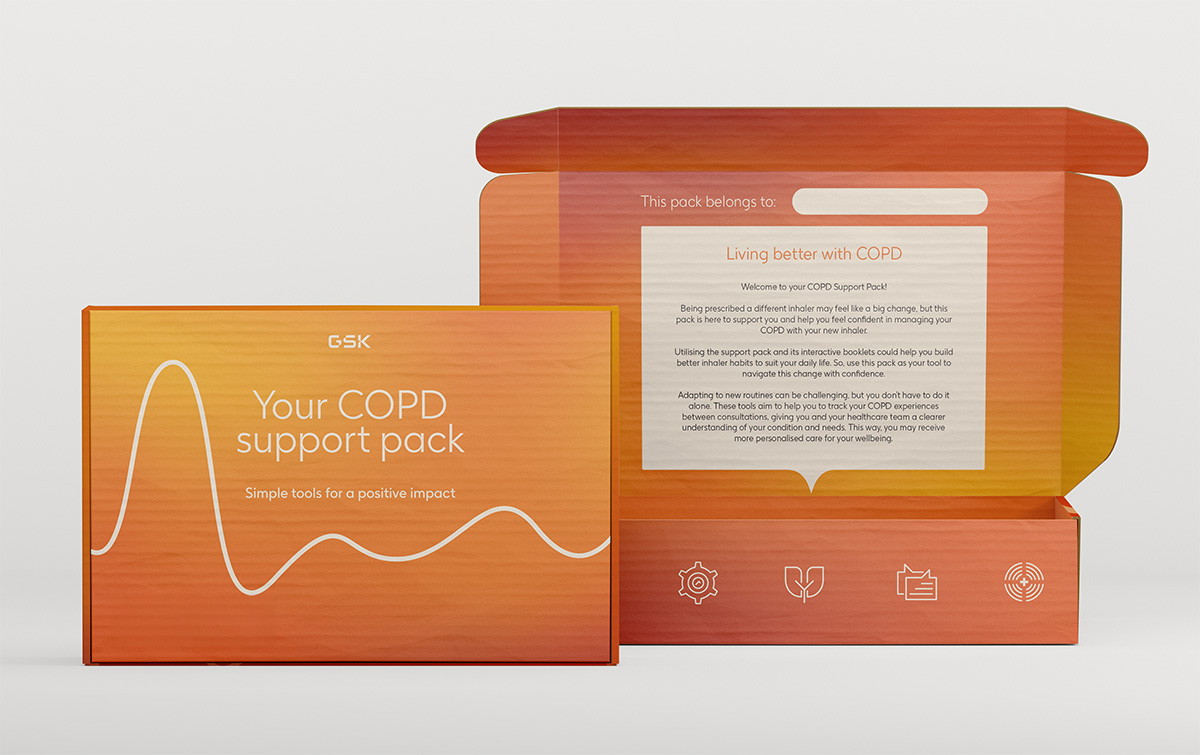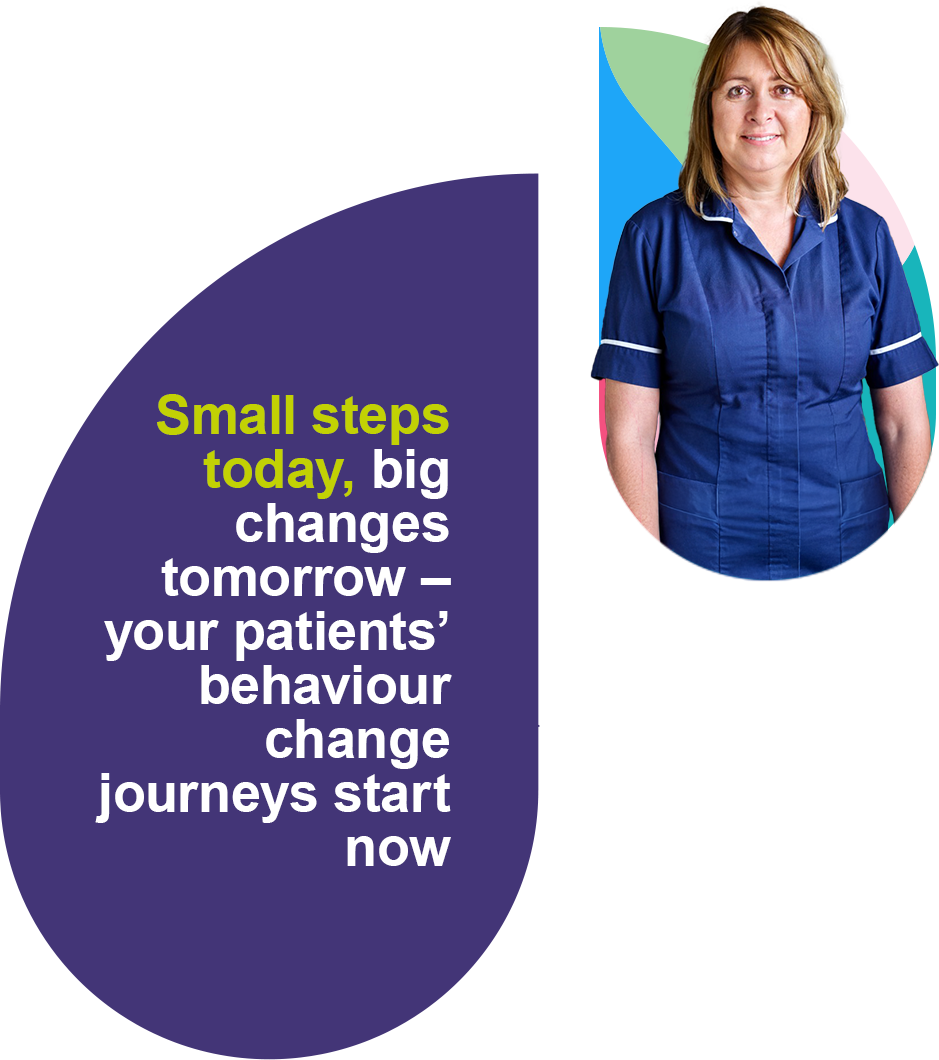Adverse events reporting and prescribing information can be found at the bottom of the page.
This material was developed in collaboration with a UCL business company, Spoonful of Sugar, industry leaders in the application of validated behavioural science frameworks and tools developed from extensive research into helping patients and healthcare professionals to get the best from treatments by enhancing engagement, adherence and persistence to optimise health.1
Experiencing
Nervousness in Patients
Use our behaviour change frameworks in a no-blame approach to help identify underlying beliefs driving behaviour change in your patient consultations.
Bridge the Gap: Solutions for Common COPD Patient Doubts and Concerns
Addressing common doubts and concerns
Click on each box to see how you can alleviate underlying regimen concerns in patients and optimise their COPD care with their
Trelegy Ellipta (fluticasone furoate/umeclidinium/vilanterol) device.
- Certain medications are formulated to provide relief over a full 24-hour period.3
- Studies have shown that once-daily inhalers can be as effective as those taken twice-daily.6
- Taking your inhaler at the same time each day can help maintain symptom control throughout the day and night.3
- After demonstrating the correct inhaler technique, it's helpful to ask patients to show you how they use the inhaler, ensuring proper usage.7
- Using your inhaler daily can help manage the symptoms of COPD by addressing the underlying inflammation that may be present
- Consistent use of your prescribed inhaler medication is important for its effectiveness.3
- Ongoing research continues to develop new treatments for COPD that may offer improved effectiveness or ease of use, compared to current options.4,5
Top Tips to encourage patients to set new goals and implement new changes!
Start Small
Break big goals into smaller, achievable ones to build confidence quickly. For example, start with short, daily breathing exercises to improve lung function gradually.
Stack Habits
Link new habits to existing routines, such as taking Trelegy when - making the bed, reading the newspaper in the morning or going for a morning walk, filling in your daily symptom tracker or even setting their alarms for the next day.
Make It Social
Involve family and friends for support. Could they bring a loved one to their COPD appointments to help them remember important information and provide emotional support?
Make It Fun
Add enjoyment to tasks - tracking symptoms, medication adherence, or physical activity while listening to their favourite music or the radio to make the process more engaging.
Celebrate
Recognise progress and celebrate successes, encouraging use of GSK’s COPD Patient Support Pack tools.
Highlight their achievements, such as maintaining a medication schedule or improving exercise tolerance!
COPD Support Packs
Empowering your patients’ COPD journeys
Equip your patients on their device transition journey through use of GSK’s COPD Support Packs, that may help patients establish better COPD management habits and adherence to their inhaler routines.
Visit our Resources page for more tools to support patients on their change journey
Unlocking Insights
The Value of Open Questions
Open questions to uncover the patient mindset
Open questions could help uncover perceptual and practical barriers impacting your patient’s motivation and ability to change. Adopting a no-blame approach would help as well.
Try these open questions in your next patient discussion:
- How has your COPD stopped you from doing your daily activities and what you want to do in your day-to-day life?
- How would you like things to be different?
- On a scale of zero to ten, how worried are you about changing to a different inhaler? Where zero – is not worried at all and ten is extremely worried. What would it take for you to go down to a lower number?
- We’ve talked a lot about all your possible inhaler options today. What do you see as the next step for you?
- What could support you in making these changes?

Ready to utilise the 3-step PAPA™2 Approach?
Support more positive behaviour changes in patients by addressing perceptual and practical barriers in the discussion.
Necessity
Discover what is important. How does a change help the patient achieve something that is important to them?
Concerns
Address any worries about potential downsides to change. Consider short-term and long term consequences.
Practicalities
Make the change as easy and as convenient as possible. Direct patients to the appropriate resources and support.

Introducing the Behaviour Change Pocket Guide
Coming soon!
Designed to distil key behavioural science insights from the inhale hub into concise and actionable points for your patient consultations. These pocket guides act as a quick reminder, aiming to empower healthcare professionals with additional tools needed to facilitate positive patient outcomes.
Key Points
Use the 3 steps of Necessity, Concerns and Practicalities in consultations to challenge patients’ device preference and support behaviour change.
- Increase patient confidence quickly by setting small and achievable goals
- Stack new habits onto existing routines for success
- Open questions can reveal doubts and concerns

Together, we can support patients in making positive changes to help manage their COPD
Explore Practical Tips NowReferences
- Spoonful of Sugar – making the most of medicines. Available from sosadherence.co.uk
- Horne R, et al. Eur Psychol. 2019: 24(1): 82-96
- Trelegy PIL. Available from https://www.medicines.org.uk/emc/files/pil.8666.pdf
- Vanfleteren L et al. Int J Chron Obstruct Pulmon Dis. 2018; 3971-3981. DOI: 10.2147/ COPD.S185975
- Halpin DMG et al. Int J Chron Obstruct Pulmon Dis 2022:17 2417–2429.
- Rogliani P et al. J. Clin. Med. 2022, 11, 4491. https://doi.org/10.3390/jcm11154491
- Dantic DE. Health Educ. J. 2014, Vol 73(1) 41–50
November 2024 | PM-GB-CPU-WCNT-240013
For the GB and NI Trelegy Ellipta® (fluticasone furoate/umeclidinium/vilanterol) prescribing information Click here.










